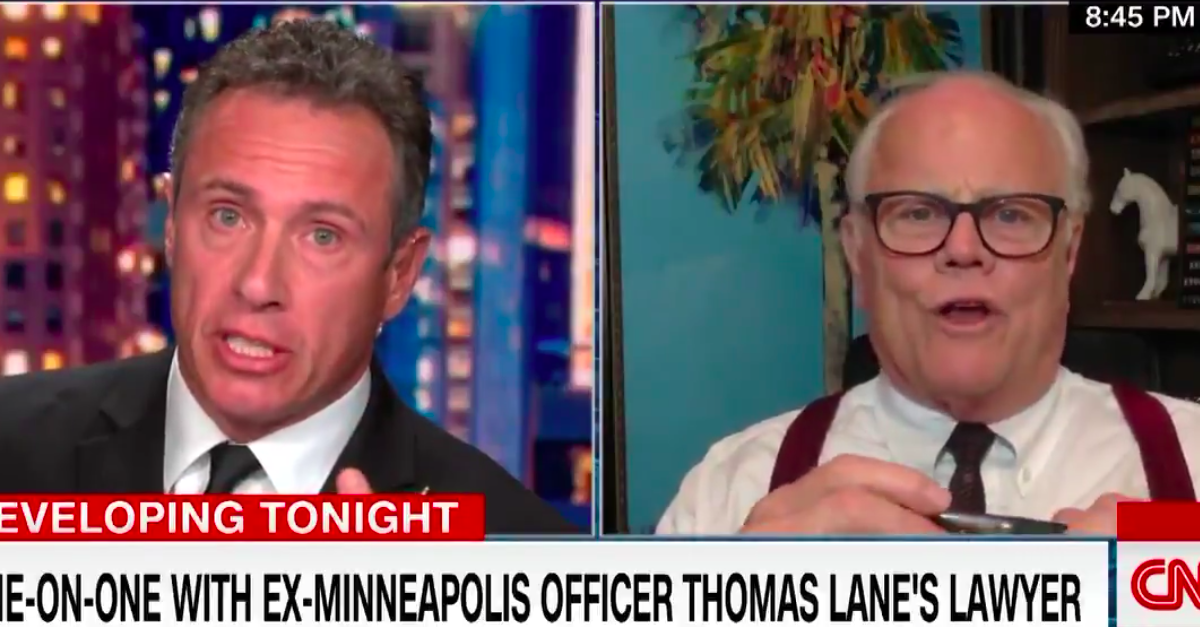
An attorney for Thomas Lane, one of four former Minneapolis police officers charged in the death of George Floyd, attempted to defend his client’s failure to intervene during the nearly nine minutes that former officer Derek Chauvin had his knee on Floyd’s neck. The attorney, Earl Gray, said on Monday night that no civilian bystanders stepped in to stop the officers either.
Gray made the comments during a lengthy appearance on CNN’s Prime Time with Chris Cuomo. Gray was immediately met by backlash from attorneys who said his remarks were a big mistake.
“If all these people say, ‘why didn’t my client intercede,’ well, if the public is there and they’re so in an uproar about this, they didn’t intercede either,” Gray said, adding that Lane was holding down Floyd’s legs and was in a position where he “couldn’t really see” what was going on.
This statement prompted Cuomo to cut Gray off and point out two glaring problems with that explanation.
“One—you’re lying on a man’s legs, you’ve got a fine view of what’s going on with that man. The other officer is literally a foot in front of you on his neck. Two, I understand that he has a senior officer telling him what to do, but there’s also a duty to intervene. And if the officer is doing something that is dangerous to a civilian, you have a duty to intervene, and he did not intervene,” Cuomo said. “And the idea that the civilians should have rushed in to a policing situation in the inner city of Minneapolis against four police officers that have weapons and are kneeling on the neck of a man—don’t you think that’s asking a little much of civilians and a little too little of your client?”
CNN then put up a graphic showing Section 5-303.01 of the Minneapolis Police Department’s Use of Force Policy concerning an officer’s duty to intervene. The section states: “It shall be the duty of every sworn employee present at any scene where physical force is being applied to either stop or attempt to stop another sworn employee when force is being inappropriately applied or is no longer required.”
Gray didn’t have much of a response, saying he “just brought that up” without providing an explanation as to why it was relevant. Gray later said that his client, a rookie, thought he was following the Minneapolis Police Department protocol.
“This was quite possibly the worst comment I’ve ever seen a lawyer make in defense of his client,” national security attorney Bradley P. Moss said of Gray’s appearance.
Moss’s view was joined by his colleague, attorney Mark Zaid.
“I often speak to media about my clients, but majority of my cases are civil. Sometimes in criminal cases interviews are appropriate, but the [attorney] best really be prepared to be persuasive,” Zaid wrote. “There are reasons why criminal defense [attorneys] should not speak publicly. This is one example.”
“There’s a reason good lawyers don’t litigate their clients’ cases on Cable TV,” wrote a criminal defense attorney known to the Twitter world only as Greg.
The Gray interview on CNN came a few days after the attorney seemingly called the theory of the case against his client “bullshit.”
“I’m not claiming that he was following orders,” Gray said in response to a question from CNN’s Josh Campbell. “I’m claiming that he thought what he was doing was right. Because he asked a training officer: ‘Should we roll him over?’ Twice. You’ve got to have criminal intent for second-degree murder. And, frankly, this is bullshit.”
[image via CNN/YouTube screengrab]